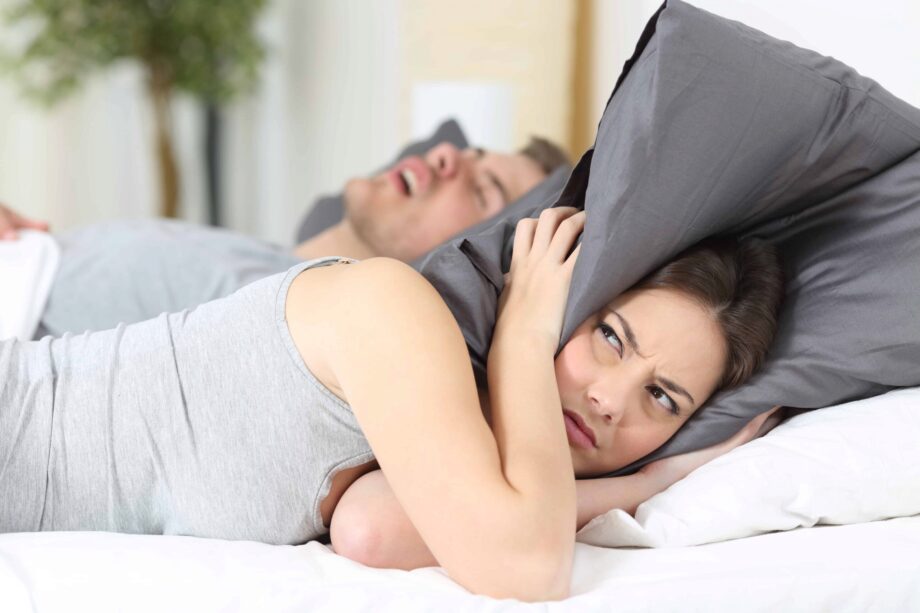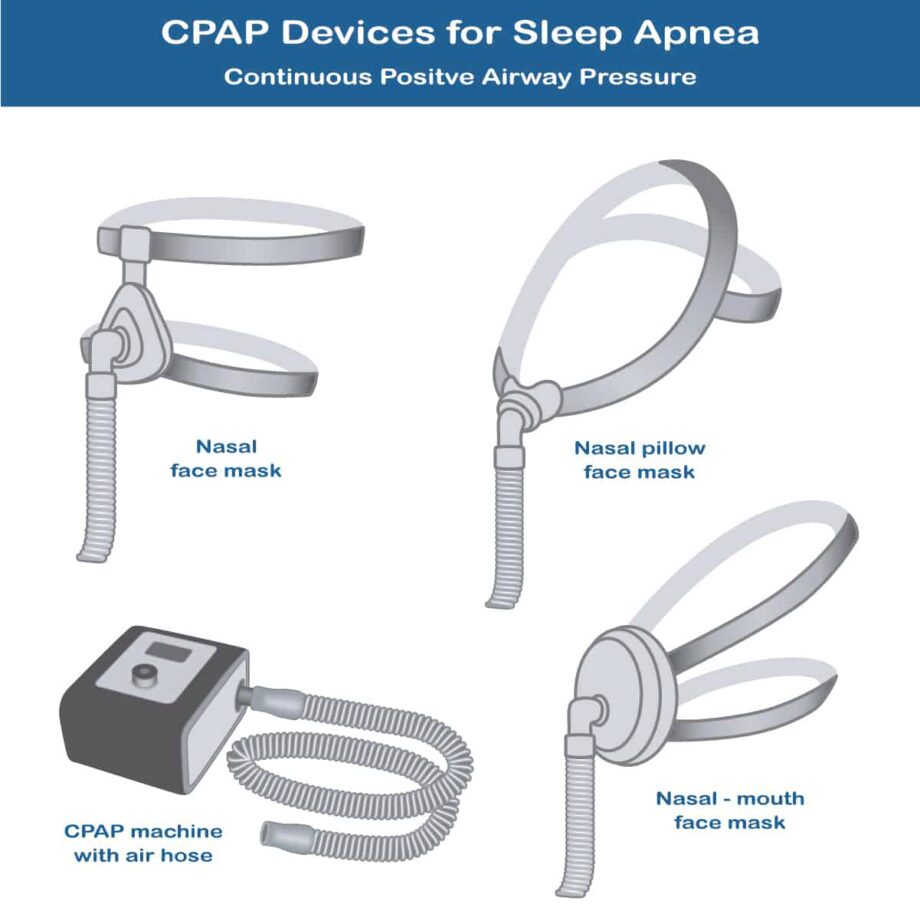Snoring and Sleep
Disclosure: By clicking on the product links in this article, Mattress Nerd may receive a commission fee at no cost to you, the reader. Read full disclosure statement.
Snoring is common. In fact, about half of all Americans snore at some point in their lives and a whopping 25% snore regularly. Even if you aren’t aware (or deny) that you snore, snort, breathe heavily, or even “saw logs” in your sleep, chances are it’s affecting your sleep and likely your bed partner’s as well.
“Snoring is the sound caused by air rushing past the floppy tissues of the throat/upper airway,” says Dr. Jamison R. Spencer, DMD, MS, with the Centers for Sleep Apnea and TMJ in Salt Lake City Utah and Boise Idaho. This occurs when the soft tissue relaxes too much and falls to the back of the throat.
Light snoring may not disrupt your sleep, but heavy snoring may be a sign of obstructive sleep apnea, a serious sleep disorder that can interfere with your sleep and result in serious mental and physical complications. Plus, “people who snore are also twice as likely to die prematurely,” Dr. Spencer cautions.
But snoring doesn’t have to adversely impact your sleep — or your bed partner’s. There are treatments that can help reduce snoring. The first step, however, is identifying the underlying cause.

What Causes Snoring?
Mouth anatomy: When we sleep, the tongue naturally falls to the back of the throat to allow air flow through the mouth into the airway. Snoring can occur when the tissues and muscles in the mouth relax too much and vibrate, producing that familiar snoring sound. This can be caused by mouth anatomy abnormalities such as a large tongue, enlarged adenoids and tonsils, or an elongated uvula, which protrudes downward at the back of the throat.
Obstructive sleep apnea: “Loud, chronic snoring is one of the most common symptoms of sleep apnea,” says Dr. Daniel Rifkin, a board certified neurologist, sleep specialist, and CEO of Ognomy. Obstructive sleep apnea is a serious sleep disorder in which the tissues in the back of the throat temporarily block the windpipe causing you to jolt awake and gasp for air. Left untreated, sleep apnea can increase your risk for heart disease, stroke, diabetes, and other health conditions. It can also leave you feeling excessively sleepy during the day which can impact your mental and physical health and leave you prone to accidents and injuries.
Alcohol consumption: “Alcohol and other muscle relaxants are known to increase snoring,” Dr. Rifkin says. “These drugs relax the tissue in your throat, which causes snoring as air vibrates against that tissue as you breathe.”
Smoking: Studies suggest that smoking is a “major contributor” to snoring not just in those who smoke but in those exposed to secondhand smoke in their homes as well. One theory is that smoke from tobacco products like cigarettes can inflame the upper airways and trigger snoring. Another theory is that overnight nicotine withdrawal disrupts sleep and can cause obstruction of the upper airway.
Sleep deprivation: When you don’t get enough sleep, you become tired and weak. The same goes for the muscles and soft tissues in your mouth. When your throat relaxes too much, you become prone to snoring.
Sleep position: Snoring is caused by the vibrating of relaxed, soft tissues in the mouth. When you sleep on your back, gravity naturally draws the tongue and other tissues downward into the windpipe. “When that happens, the diameter of the throat becomes smaller and you’ll be more apt to snore,” Dr. Rifkin says.
Nasal problems: People with nasal problems like congestion or a deviated septum are more likely to snore. That’s because “people who can’t breathe well through their nose will have to breathe through their mouth,” Dr. Spencer says. “Mouth breathing dries out the tissues much faster than nasal breathing and tends to make snoring and sleep apnea worse. In some cases, improving nasal breathing may result in elimination or significant improvement in snoring and sleep apnea, but it depends on where the blockage occurs.”
Risk factors of snoring include:
Being a man: About 40% of men snore compared to 24% of women, according to the American Academy of Sleep Medicine. However, when men reach the age of 70, they become less likely to snore.
Being overweight: Having too much fat around the neck and throat can weigh on the tissues in the mouth and cause snoring. Fat around the belly can push the diaphragm up or compress the ribcage, which can slightly reduce lung capacity and cause you to snore.
Pregnancy: Being pregnant can cause snoring in much the same fashion as being overweight by putting pressure on the diaphragm and chest. Pregnancy can also cause your hormones to surge which makes the mucous membranes in your nose swell. This can lead to nasal congestion which contributes to snoring.
Having a family history of snoring: If your grandparents, parents, or siblings habitually snore, there’s a very good chance you do, too, according to a study published in the journal Chest.
Age: The likelihood a person will snore increases as they reach middle age and increases over time. The reason? As we age, the throat narrows and the muscle tone decreases. However, by the time men reach age 70, they are less likely to snore, according to the American Academy of Sleep Medicine.

Symptoms of Snoring
Some people are not aware that they snore or that their snoring is as loud and obnoxious as it is to others. Let’s look at some symptoms of snoring that indicate it may be disrupting your sleep:
- Breathing temporarily stops during sleep
- Sore throat upon awakening
- Gasping or choking at night
- Chest pain at night
- Daytime sleepiness
- Difficulty concentrating
- Morning headaches
- High blood pressure
- Your bed partner complains that your snoring is so loud it’s keeping them up at night
Snoring isn’t just an adult problem, it can occur in children as well. Up to 10% of children snore regularly. Among child snorers, 25% to 40% have sleep-disordered breathing and 2% to 4% experience obstructive sleep apnea. Here are some signs that your child’s snoring may be interfering with their sleep:
- Difficulty paying attention
- Poor performance in school
- Behavioral problems
- Hyperactivity or feeling tired during the day
- Growth retardation
- Obesity
- High blood pressure
Solutions for Snoring
Snoring can be frustrating when it keeps you or your bed partner up at night. You can try these potential solutions to improve a snoring problem.
Change sleep position: Snoring often occurs or is worse when you’re sleeping on your back. Rolling onto your side can stop or help ease the intensity of snoring. Sleeping on your stomach is not recommended as it strains the back and neck. If you are more comfortable sleeping on your back, elevating your head with pillows or an adjustable bed can reduce or prevent snoring.
Change pillows: In some cases, your pillow may be to blame for your snoring. Allergens in your pillow can cause nasal congestion and lead to snoring. If this may be the case, look for a new pillow. Some options include body pillows that make side sleeping more comfortable by helping with spinal alignment to ease strain on your lower back and neck. Some specially designed anti-snoring pillows have ridges on their surface that encourage sleepers to roll onto their sides or are wedge-shaped to elevate the head. There’s even a “smart pillow” insert that claims to detect when you snore and gently move your pillow to interrupt snoring and stimulate throat muscles to allow natural breathing.
Keep a humidifier in your bedroom: Dry air is notorious for irritating the delicate membranes in your nose and throat and making you feel stuffy. “Nasal congestion … obstructs the airways, increases blockage and the snoring vibration while sleeping, tripling the chances of snoring,” says Dr. Nikola Djordjevic, MD, GP, a medical advisor at HealthCareers. If congestion is an issue, put a humidifier in your bedroom to add moisture to the air you breathe at night.
Exercise throughout the day: Exercise is a great way to stave off snoring. First, exercise can help you lose weight which can tone muscles and reduce the fat accumulation around your neck and abdomen. Secondly, exercise can help burn energy which in turn helps you fall asleep faster and sleep more soundly at night. It also releases endorphins, the “feel good” hormone. Because of that, though, you’ll want to avoid doing any strenuous exercise too close to bedtime as doing so can make it difficult to fall asleep.
Be aware of what you eat before bedtime: Believe it or not, what you eat before bedtime can affect your sleep and your chances of snoring. Some foods can trigger allergies which can cause mucus to build up in the nose and throat, and cause snoring. Some of the foods that may trigger these responses include dairy products, high-protein meats such as red meat and pork, wheat and soy products, and sugar.
Limit alcohol consumption: A night cap can ease the tension of the day and help you nod off quickly at night. But too many alcoholic beverages before bedtime can not only make you wake during the night and have difficulty falling back to sleep, it can also make you snore loudly. That’s because alcohol relaxes the tissues and muscles in your throat and makes them more susceptible to vibrating.
Avoid tobacco: A quick smoke before bedtime not only contributes to morning after bad breath. It acts as a stimulant making falling to sleep difficult. It also irritates the nose and throat which makes you more prone to snoring.
If your snoring is severe, these devices might help:
CPAP: CPAP, or continuous positive airway pressure, therapy is a common treatment for sleep apnea. If your snoring is related to untreated sleep apnea, CPAP therapy may help both your sleep apnea and your snoring. A CPAP consists of a face mask that’s hooked up to a machine by a long hose.
Custom-fit dental devices/lower jaw-positioners: There are several types of oral and nasal appliances your dental specialist can recommend that can help reduce snoring, such as:
- Tongue stabilizing devices, which sit at the lips and look somewhat like a pacifier. They use suction to pull the tongue forward and lift the soft tissues away from the back of your throat.
- Mandibular advancement devices fit inside the mouth and have metal hinges that allow the lower jaw to gently slide forward.
- Nasal dilators are made up of two small rings that fit into the nostrils and open the nasal cavity. They increase airflow and reduce snoring. Another benefit to nasal dilators is that you won’t need to see a dentist to get this device.

Final Thoughts
Many people don’t consider snoring to be a serious problem. But when it interferes with your sleep or the sleep of your bed partner, it may be time to address it. Especially since snoring may be a sign of a bigger problem like obstructive sleep apnea. If left untreated, snoring and sleep apnea can contribute to fragmented sleep and sleep problems as well as a host of physical and mental health issues, injuries, and accidents.
There are things you can do at home to reduce or eliminate light snoring. But if you are a heavy or frequent snorer, it is wise to talk with a medical professional to rule out serious underlying causes.
“Snoring can get very annoying for some people and can be caused by many factors, some less obvious than others,” Dr. Djordjevic says. “Once the underlying cause is identified, snoring can easily be treated or controlled.”


